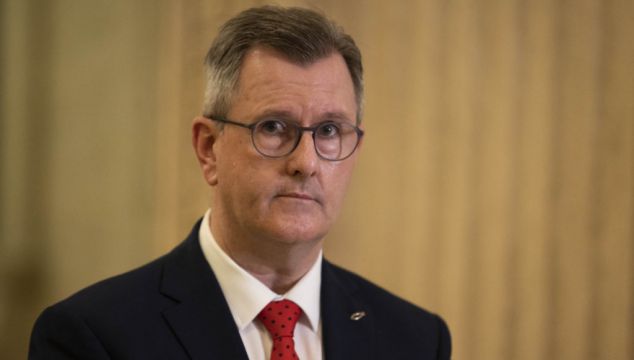DUP leader Jeffrey Donaldson has said that his party was patient when it came to negotiations between the EU and the UK over the Northern Ireland protocol, but that the deadline of January 31st had passed with no progress.
Mr Donaldson told RTÉ radio’s Morning Ireland that he had told UK foreign secretary Liz Truss that the DUP needed to see progress before the deadline, but that had not happened. He added that he had also spoken with British prime minister Boris Johnson who had told him there was only a “20 per cent to 30 per cent chance” of agreement being reached by the January 31st deadline.
The EU and the Irish Government had argued that the main purpose of the protocol was to protect the Good Friday Agreement, he said, but that ignored the fact that no unionists supported the protocol which “cuts across” the point of consent in the Good Friday Agreement.
'No progress'
“We were told there would be a short sharp negotiation, but still there has been no progress.”
Mr Donaldson said that the Assembly could continue to operate as a legislature and that legislation would continue “right up to the date” when it was dissolved for the election.
“We’ve been very patient. Everyone accepts that the Northern Ireland protocol is causing real economic damage to Northern Ireland.”
On the same programme Claire Hanna of the SDLP said it was important to minimise friction, but that the DUP was “playing up” the difficulties in the protocol. “There are solutions out there.”
The DUP created this mess.
Northern Ireland was still recovering from the last time “this stunt was pulled” after which there had been “a three-year black hole”, she said.
Alliance Party leader Naomi Long has described the DUP’s actions as “politically motivated”.
“I believe what the DUP have done is a cynical election ploy, and they are playing games with people's lives and people's livelihoods,” she told Newstalk Breakfast.
“People in Northern Ireland are facing into a cost of living crisis, here in Northern Ireland we have some of the longest waiting lists for our hospitals anywhere in Western Europe. Our public services are groaning after 10 years of austerity and two years of the pandemic.”
The DUP should have worked through the last few months of the Assembly, considering it had been suspended for the first three years, she added.
“It just seems to be like a very self-indulgent move, electorally motivated, party motivated - but certainly not in the interest of Northern Ireland.”
Elections
Ms Long did not agree with calls for the date of elections to come forward, her party was ready and would do well, but there were issues that had to be tackled now. “There are things here we can salvage."
“So I say we adults in the room need to pick up the pieces of what the DUP has smashed up, and try and put something together. This shouldn't be about Sinn Féin seeking party political advantage in the election. This should be about us acting like mature politicians and trying to deliver for the people who elected us.”
Sinn Féin’s John Finucane told Morning Ireland that the DUP’s “reckless decision” would have serious repercussions for the people of Northern Ireland.
“This has left a huge mess for the other parties to pick up.”
Sinn Féin was committed to power-sharing and Michelle O’Neill would be meeting all the party leaders to see what legislation could be saved, he said. There were now serious questions about the DUP’s commitment to power-sharing.
When asked about the previous occasion in 2017 when Sinn Féin had brought down the Executive, Mr Finucane said that on that occasion if the DUP had acted the Executive could have returned within a few weeks.
Ulster Unionist Party leader Doug Beattie said that politics was about putting the best foot forward and working with everybody.
The DUP’s actions were not going to change anything. Yes, there was frustration among Unionists with the Northern Ireland Protocol, but negotiations were going in the right direction.
Removing the First Minister was not going to change the situation – “it was a pointless action” that is going to impact on the people of Northern Ireland.







